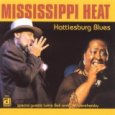
88.1FM
WYCE
-
or visit our secure sign-in page
sign in or sign up...
OR ...with your email address

Community Media Center

2012-07-12
Kicking her career into its next phase with her own record label, Chicago based blues singer, writer and guitarist Liz Mandeville uses the occasion to launch 11 new tunes that feature her adroit mix of traditional blues, saucy double entendre gems and poignant ballads. While she has spent a good share of her career behind the microphone, this release also finds her flexing her guitar chops on every track. Joined by Willie "Big Eyes" Smith on drums and harmonica, Eddie Shaw on sax, Donna Herula on slide guitar, Darryl Wright on bass, Nick Moss on guitar and Leandro Lopez-Varady on grand piano, Mandeville has the necessary instrumental firepower behind her to add interesting dimensions to each cut. "Clarksdale/Riverside Hotel Blues" is a loping shuffle with tinkling piano propelling Mandeville's tale of reconnecting with the roots of the blues. "4:20" is a low key, traditional acoustic blues tune lambasting the wasteful war on drugs while "Sweet Potato Pie" is a rocking double entendre number with plenty of heat compliments of Shaw's wailing saxophone. Willie "Big Eyes" Smith's always perfect drumming and wailing harmonica add down home authenticity to the salacious "Roadside Produce Stand" and the Jimmy Reed style shuffle of "Walking & Talking With You". While most blues discs travel the same lyrical path with bad love, bad luck and bad whiskey getting most of the attention, Mandeville takes interesting detours into the perils of springtime floods, "Sand Baggin'", the hardships and angst faced by spouses of combat troops, "A Soldier's Wife", the lessons passed down from earlier generations, "Mama & Daddy Blues" and even the new found role of women in the Military, "My Mama Wears Combat Boots". While Mandeville's rich voice powers every tune, the a cappella delivery of "No Fear/Everything" demonstrates the terrific ability she has to go from low register gut-bucket blues to wailing gospel sweetness. After a number of discs that focused more on the party hearty side of the blues, this release reflects a more introspective mood and, as suggested by the title, takes Mandeville back closer to the roots of the blues. SMITTY
MISSISSIPPI HEAT
HATTIESBURG BLUES

HADDEN SAYERS
Hard Dollar

JOHNNY NICHOLAS
TOO MANY BAD HABITS

ANA POPOVIC
Unconditional

DANNY BROOKS & LIL MISS DEBI
ARE YOU READY?

ROOT DOCTOR
- Live at the Cadillac Club
The opinions expressed in these reviews are those of the individual volunteers that submitted the article and do not necessarily reflect the views of WYCE or GRCMC; nor its staff, donors, or affiliates.